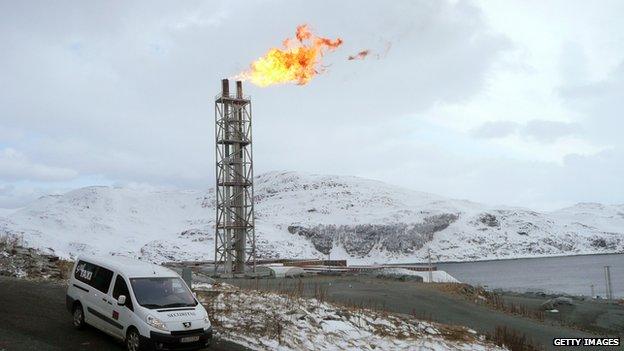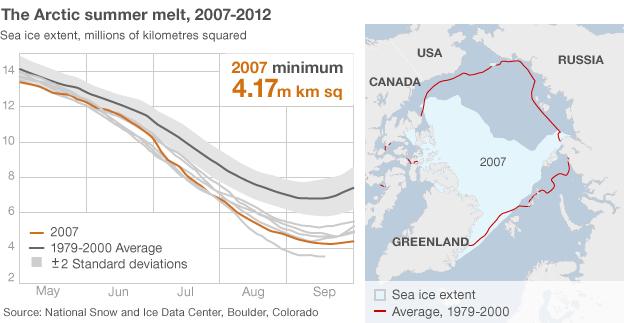Concerns raised over 'useless' Arctic oil spill plan
- Published

Oil and gas processing plants like this one on Melkoeya island on the northernmost tip of Norway are likely to become more common.
Environmental campaigners say that a draft plan to respond to an oil spill in the Arctic ocean is inadequate and vague.
The proposal, external has been in preparation for two years as oil companies look to increase exploration in the region.
Greenpeace says it fails to get to grip with the risks of an accident in an extremely sensitive location.
Ministers from the eight nation Arctic Council are due to discuss the plan at a meeting in Sweden tomorrow.
As summer ice in the Arctic has declined in recent years, the area has become the subject of intense interest from oil and gas companies. Estimates, external from the US Geological Survey indicated that there could be 60 billion barrels of oil in the region.
Glaring hole
In 2011 The Arctic Council members signed the Nuuk, external Declaration that committed them to develop an international agreement on how to respond to oil pollution in the northern seas.
Now Greenpeace have released a draft of the plan that they say is simply inadequate.
"The big glaring hole is that it is such a vaguely worded document that it doesn't seem to force countries into doing anything," Ben Ayliffe from Greenpeace told BBC News.
"For all intents and purposes it is a useless document," he said.
The plan says that "each party shall maintain a national system for responding promptly and effectively to oil pollution incidents" without requiring any clear details on the number of ships or personnel that would be needed to cope with a spillage.
But Sweden's ambassador to the Arctic Council, Gustaf Lind, rejected the Greenpeace claims that the document was woolly and vague.
"The agreement is a great step forward for the protection of the Arctic from an oil spill because it sets up a system for the states to co-operate in practice," he said.
"I think Greenpeace misses the target because they criticise the agreement for not regulating oil companies, that is not the purpose of it at all."

Ben Ayliffe says he believes the Arctic Council plan would be ineffective if a spill occurred.
"It would be a nightmare scenario, you're facing oil drifting for thousands of miles under ice, the technical challenge of operating in darkness would make mounting the sort of response that BP had to do in the Gulf, completely impossible," he said.
Late last year, the House of Commons environmental audit committee called for a halt to oil drilling in the Arctic until a pan-Arctic response plan was in place. They called for a stricter financial liability regime to require oil and gas companies to prove they could meet the costs of cleaning up a spill.
According to chair of the Committee Joan Walley MP, there were big questions over the abilities of these companies to deal with a spillage.
"The infrastructure to mount a big clean-up operation is simply not in place and conventional oil spill response techniques have not been proven to work in such severe conditions," she said.
The Arctic Council consists of the United States, Russia, Canada, Norway, Sweden, Finland, Denmark and Iceland.
- Published15 January 2013
- Published20 September 2012
- Published31 August 2011